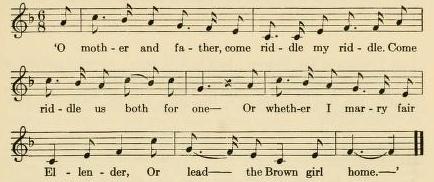Lord Thomas and Fair Ellender- Holder (NC) 1914 Brown Collection Version E
[From Brown Collection of NC Folklore; 1952.
R. Matteson 2012, 2014]
E. 'Lord Thomas and Fair Ellender.' Sent in in 1914 by D. W. Fletcher of RED 4 near Durham, from the singing of D. E. Holder, who learned it from his mother. The "mense" of stanzas 3 and 8 stands perhaps for "immense"; line 2 of stanza 3, meaningless in this place, is probably merely a careless anticipation of the same line in stanza 8; "before" in stanza 2 should apparently be "therefore."
1 'O mother and father, come riddle my riddle,
Come riddle us both as one,
Whether I marry fair Ellender
Or bring the brown girl home.'
2 'The brown girl she has house and land,
Fair Ellender she has none;
Before I charge you with my great blessing
To bring the brown girl home.'
3 He dressed himself in mense array,
This maid in morning-green,
And every village he rode through
They taken him to be some king.
4 He rode unto fair Ellender's hall,
He knocked so loud at the ring;
There was none so ready as fair Ellender herself
To rise and welcome him in.
5 'Oh, what is the matter, Lord Thomas?' she cried,
'What news have you brought to me?'
'I have come to ask you to my wedding.
And I'm sure it's sad news to tell.'
6 'Now mother and father, come riddle us now,
Come riddle us both as one,
Whether I go to Lord Thomas' wedding
Or stay with you at home.'
7 'There's many that be there that be your friends.
There's many that be your foe.'
'But little do I care for all of that;
To Thomas' wedding I'll go.'
8 She dressed herself in niense array,
Her maid in morning[1] green,
And every village she rode through
They taken her to be some queen.
9 She rode up to Lord Thomas' hall;
So loud she knocked at the ring;
There was none so ready as Lord Thomas himself
For to rise and welcome her in.
10 He taken her by her lily-white hand
And led her through the hall
And set her down at the end of the table
Above his own bride and all.
11. 'O Thomas, O Thomas, is this your bride?
I think slie looks wonderful brown,
When once you could have married as fair a skin lady
As ever the sun shone on.'
12 The brown girl she had a little pen-knife,
'Twas both keen and sharp.
Between the long ribs and the short
She retched fair Ellender's heart.
13 'Oh what is the matter?' Lord Thomas he cried,
'What makes you look so pale,
When you once used to carry as red rosy cheeks
As ever shined under a veil ?'
14 'O Thomas, O Thomas, are you not blind?
Why, can't you very well see?
I think I feel my own heart's blood
A-trickling down by me.'
15 Lord Thomas he had a little bright sword
A-hanging in the hall.
He cut off his own bride's head
And stove it against the wall.
16 Lord Thomas he had a little pen-knife,
'Twas both keen and sharp.
He put the handle against the ground
The point against his heart.
17 He placed the handle against the ground
And the point against his chest,
Saying, 'Here lies the death of three long lovers.
Lord, send our souls to rest!
18. 'O mother and father, go dig my grave,
And dig it wide and deep,
And bury fair Ellender by my side
And the brown girl at my feet.'
E. 'Lord Thomas and Fair Ellender.' Sung by D. E. Holder. Procured by D. W. Fletcher of Durham, RFD 4. This is the melody to 'Lord Thomas and Fair Annet' mentioned together with 'Barbara Allen' as having probably been sent in by Dr. I. G. Greer. The assumption of the editor, as expressed in II 131, to the effect that one tune had to do double duty for both texts, is not borne out by the facts. There are actually two separate and distinct melodies, one for each song. Perhaps the fact that both melodies were written on a single small sheet of manuscript paper was responsible for this deduction.

Scale: Irrational, plagal. Tonal Center: f. Structure: aba1b1 (2,2,2,2) = aa1 (4,4). Interesting here again is the use of the melodic material. The second half of measure 1 plus the first half of measure 2 serve to furnish the last two measures. Naturally, we find again the rhythmic shift.